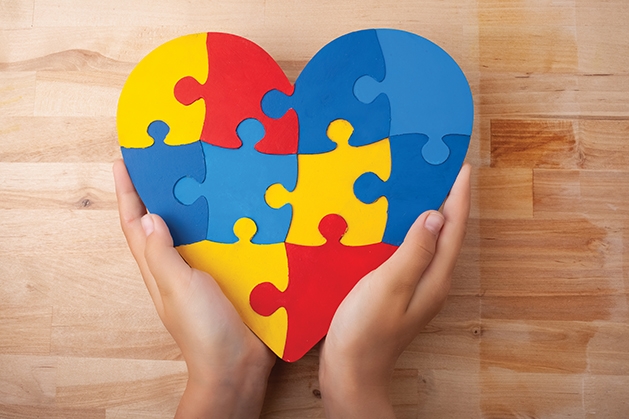
FOR PARENTS RAISING A CHILD WITH AUTISM, it may at times feel isolating—but they’re far from alone. The Centers for Disease Control and Prevention (CDC) estimates that one in 44 children in Minnesota have been diagnosed to be on the autism spectrum disorder (ASD) and the Minnesota Autism Center (MAC) understands those emotions all too well.
The MAC provides support and therapy for individuals diagnosed with ASD. Their programs focus on those from 18 months to 21 years old and works diligently to provide individualized support for families.
“Our therapy's goals usually focus on one of two outcomes,” says Tony Thomman, director of strategy and innovation. “Preparing a child to be able to go to school and have success or preparing them with independent living skills.”
Families involved with MAC are guided to programs that will be most beneficial for their loved ones with autism. “Our intake specialist and clinical team will work through an assessment to help determine what the appropriate services are for the family and their child,” Thomman says.
The center offers several therapy options, including occupational therapy, speech therapy and applied behavior analysis, which helps teach everyday life skills, such as using language to express emotion.
For Woodbury resident Angel Thao and her family— husband Chris, Nivora (1) and Veyera (8)—MAC has been life changing.
“Veyera was medically diagnosed with ASD at 3 years old [and also] Sensory Processing Disorder,” Thao says. “She is still entirely non-verbal [and] utilizes a speech tablet to communicate and she knows a few sign language gestures.”
Thao’s family has been utilizing the MAC services for two years, where Veyera engages in several types of therapies, centered around applied behavior analysis and positive behavior interventions and support, for 40 hours per week.
Not only does the MAC support youth with ASD, but the center also works with families as a whole. “We work to help them understand how autism is impacting their child,” Thomman says. “By [having family members] understand, we put them in a better place to help their child reach their full potential.”
Thomman says that early intervention is one of the most important tools for those diagnosed with ASD. “While receiving a diagnosis of autism can be scary, knowing early and having a team of people on your side makes a big difference,” he says.
“Veyera absolutely loves everyone and everything about MAC,” Thao says. “Without MAC, Veyera would not have met as many milestones today.”
Thomman and Thao agree that it’s important to facilitate autism awareness and acceptance—which is what the month of April celebrates.
Friday, April 2 also marks World Autism Awareness Day and spreads awareness, promotes acceptance and ignites change, according to the Autism Society.
“National Autism Awareness Month in April is good for people to understand that there are real people dealing with these challenges," Thomman says.
Thao says neurotypical individuals can advocate for autism by being understanding, non-judgmental, patient and kind.
“With any individual with special needs, there will be many difficult times,” Thao says. “But it is also significantly rewarding. Veyera brings so much joy, peace, love and kindness in our lives … And though she may be completely nonverbal, if you listen closely, you can hear her speak through her heart.”









